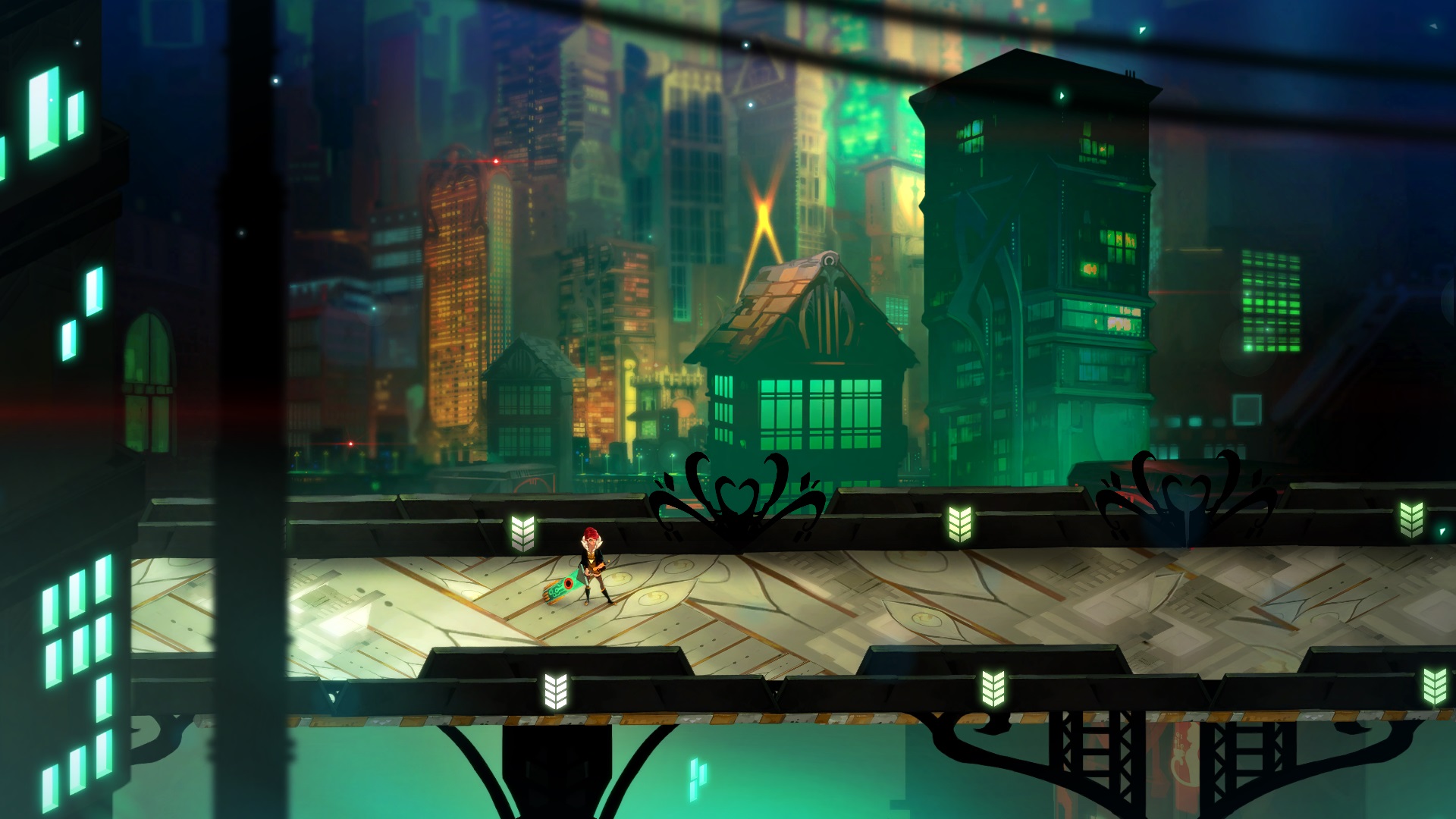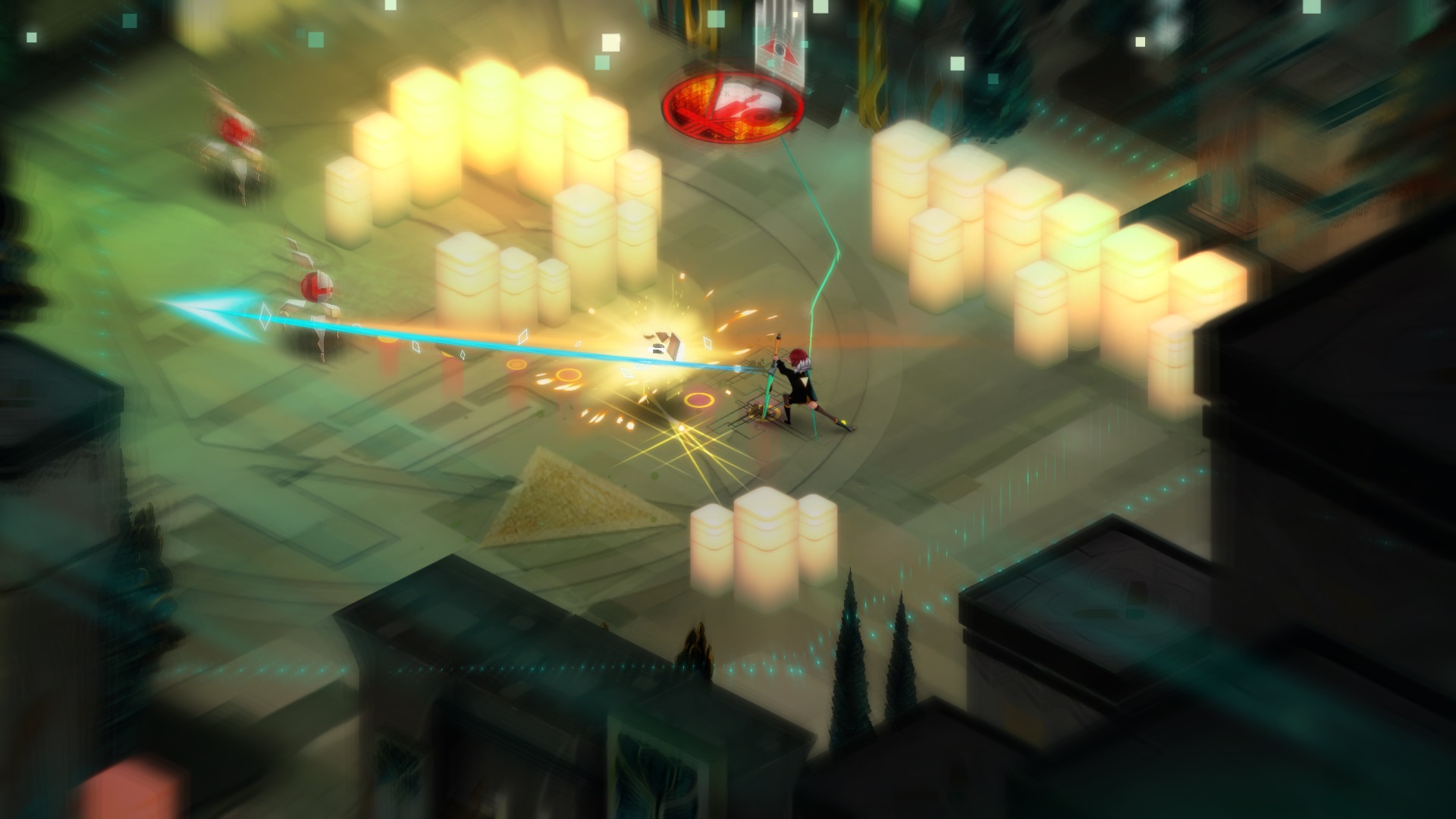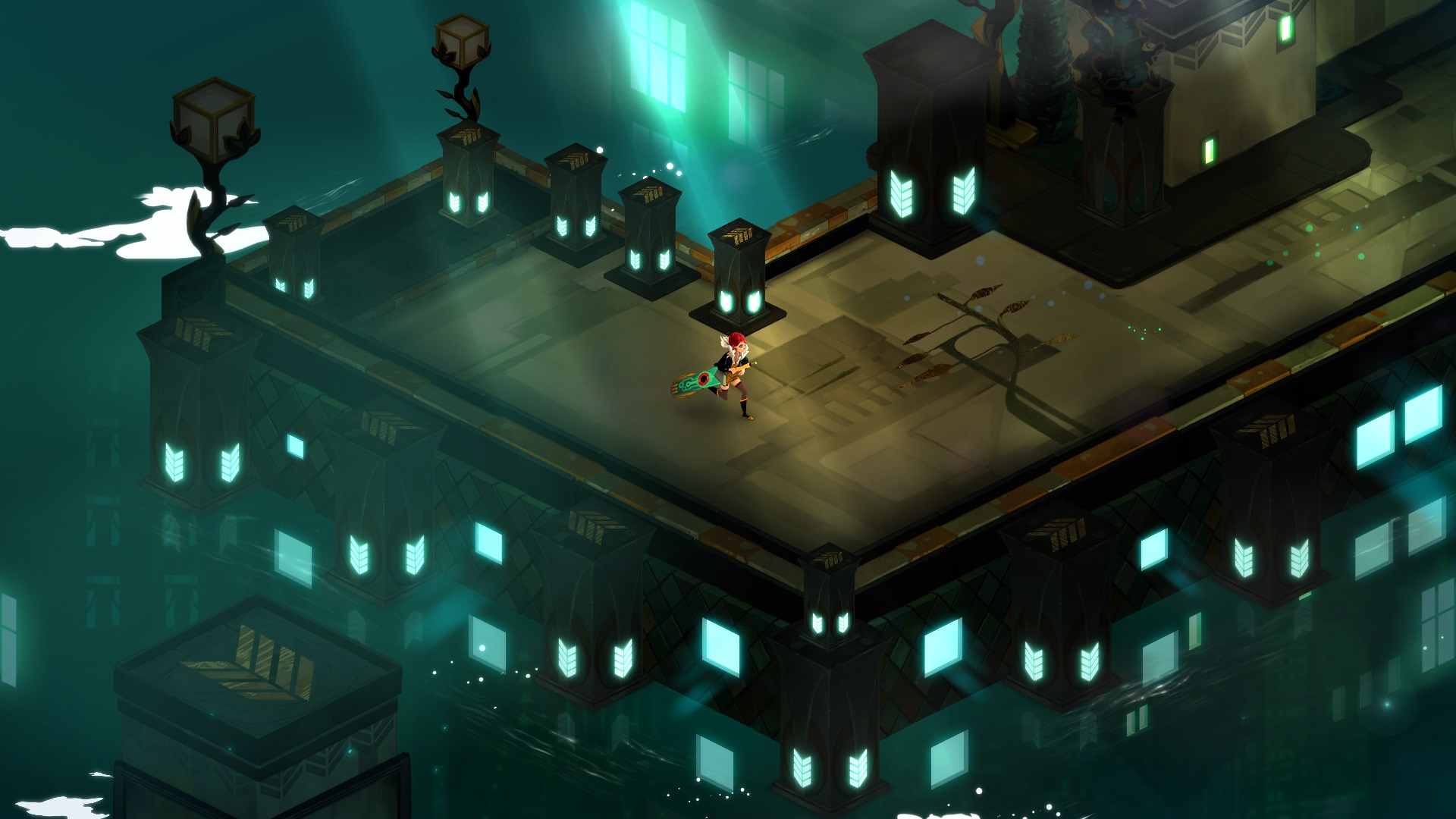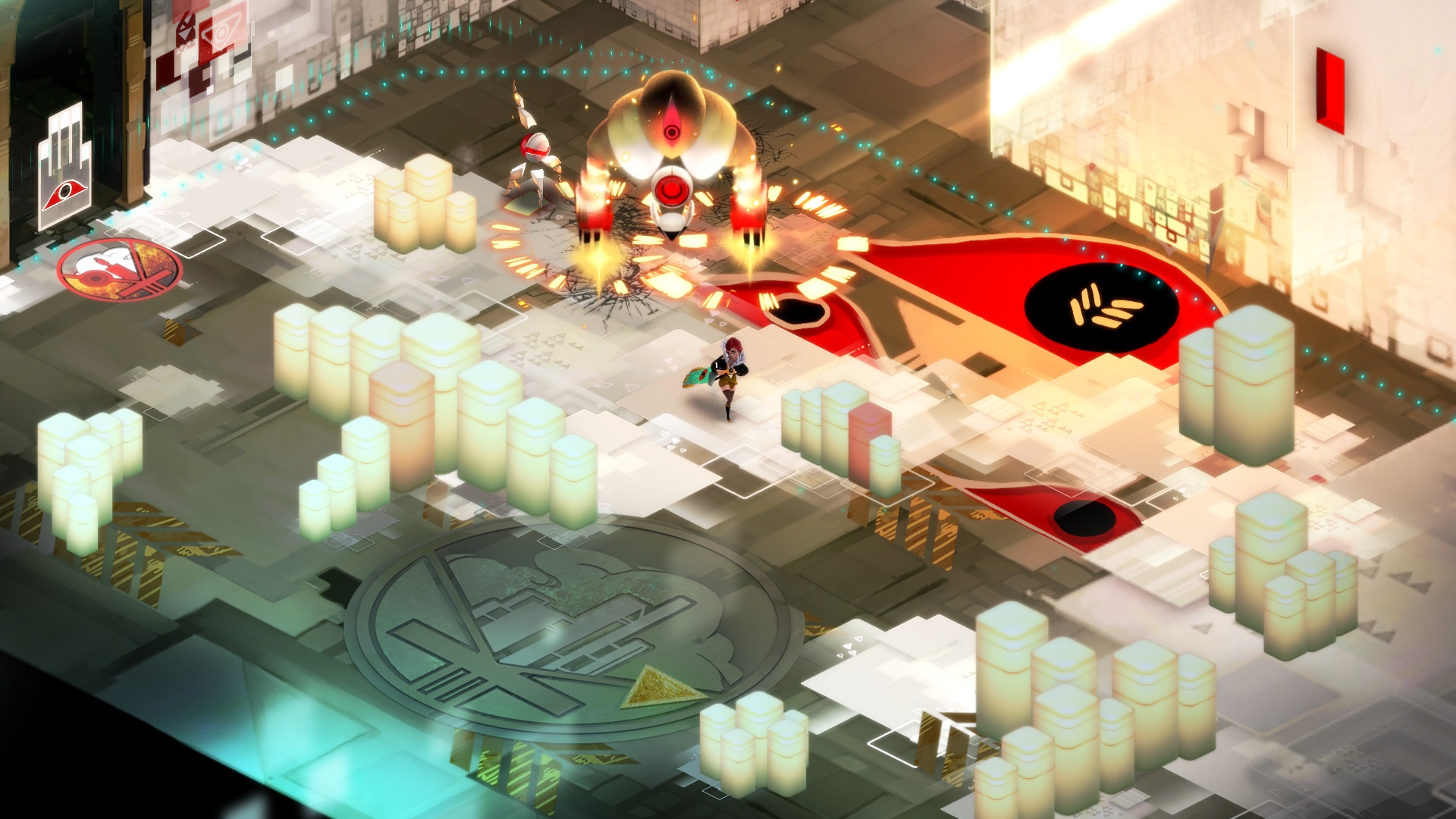Transfusive, transitory, and transcendent.
On a surface but intimate level, Transistor is a conversation between protagonist Red, an admired and fashionable opera singer who has just lost her voice in an attack, and the titular sword, responsible for killing Red's lover in the opening scene but also somehow retaining his consciousness and voice. On a deeper but subtler level, it's a remark about the transference of human consciousness into the digital space as a form of technological immortality that bends the rules of life and death. And all of this is wrapped in a time-bending, exceedingly flexible combat system. In other words, Supergiant Games has yet another stunning gem in its hands.
Without spoiling too much of the plot, it becomes clear early on that a certain group is behind Red's attack and that she's bent on revenge, a point noted by her removing her gown in the opening set piece and donning a jacket whose significance is shown soon after. Meanwhile, monsters have appeared in Cloudbank, a right-angled isometric city lined in hues of green and gold, and have systemically begun to destroy and disassemble the world into impersonal slabs of white. This carries into the theme of creation and deletion, also relayed through the game's use of programming language and terminology, with a "backdoor" area, abilities like Get() and Help(), and by the endgame the metaphorical, godlike role of the Transistor itself.
In fact, the last half-hour of the ending sequence will likely spawn multiple theories and analytical articles on the choice Red makes, the setting and framework around the final boss, and the Transistor as a transhumanist vessel. Since the sword can absorb the soul-like traces of fallen NPC—and transform them into helpful powers—perhaps it can serve as a more concrete solution for death and a path to transcendence.
As a object made sentient by way of Red's unnamed lover, the Transistor provides the majority of the dialogue, sometimes speaking on Red's behalf, but he's much more than just a narrator when compared to Bastion's baritone voice of reason. He delivers humor, direction, and keen observations on the current situation and on specific set pieces in the environment when prompted. Every word he speaks illuminates the sword, a feature best conveyed on the PS4's controller, with its light bar blinking in synchronization and its speaker solely outputting the Transistor's voice. Otherwise, Red communicates only through hums and writing on the keyboard of the numerous OVC terminals scattered around Cloudbank.
The lack of interactive NPCs and the bareness of the streets are meant to portray the downfall of Cloudbank, though it would have been fruitful to have more scenes showing the splendor of the city in its full grandeur before the descent. It's difficult to feel concerned about Cloudbank and its citizens without knowing them beforehand, at least until the second "recursive" playthrough where a firmer understanding of the story will let you place moments in the proper context.
One clever trick in Transistor ties character backstory with the flexibility of the combat system. As Red earns experience and higher user levels, she'll obtain a wide arsenal of abilities that can be placed into the four primary attack slots, or one of the many upgrade slots, or one of the unlockable passive slots. That means there are literally thousands of possible combinations of skill layouts, as every ability can be used in three completely separate ways. Also remember that every ability derives from the trace of an NPC, so to encourage you to experiment with various permutations, a piece of an NPC's background will unlock each time you successfully use its respective ability in combat. Use Red's "Crash()" ability in each of the three ways and you'll decode more information on her career as an opera singer (though I still don't know how that prepared her for the oncoming apocalypse with two-handed sword proficiency).
The combat itself, at first glance, doesn't seem that challenging given Red's power called Turn() to freeze time, queue a series of moves and abilities, and execute them in a flash. By getting behind Creeps, gargantuan Jerks, and swift Young Ladies, you can inflict extra backstab damage, and you can deal bonus combo damage by using Red's Crash ability first. Though you can't recover health, apart from a regenerative ability found late, Red has multiple lives. Losing all health initiates an emergency Turn and getting hit one last time takes away one of Red's four primary abilities but recovers all of her health. Since this makes surviving tougher, though, it's better to hide behind white pillars during turn recovery or activate Mask() to become invisible.
Getting through the eight-hour adventure isn't terribly challenging aside from the last area with enemies who fire high-damaging homing projectiles. To heighten the difficulty, you can activate Limiters that make specific enemy types more potent or participate in Speed, Proficiency, and Performance challenges found in the backdoor area. Both reward additional experience, and the backdoor challenges unlock the game's soundtrack, which complement the game definitively well with futuristic, spaced-out synth, the vocals of Ashley Barrett, and a tone that's somehow both comforting and captivating.
Taking its name from one of the greatest technological inventions of the 20th century, Transistor is unequivocally one of the greatest games this year. That it only costs twenty dollars is astounding since it could easily sell for more, and despite it being rather short, Transistor begs to be replayed at least once. It may be self-described as just a "sci-fi themed action RPG," but for once in this industry, that's severe modesty.
-
Story tackles surprising themes without being overly serious
-
Interesting dialogue between a mute and a large sword
-
Incredibly flexible combat system
-
Solid combat system that can be made more challenging with limiters
-
Gorgeous presentation
-
Cool, modern soundtrack
-
Perfect integration with PS4 controller
-
Only $20!
Transistor Screens
-
Transistor Screens #1

-
Transistor Screens #2

-
Transistor Screens #3

-
Transistor Screens #4

-
Transistor Screens #5

-
Transistor Screens #6












